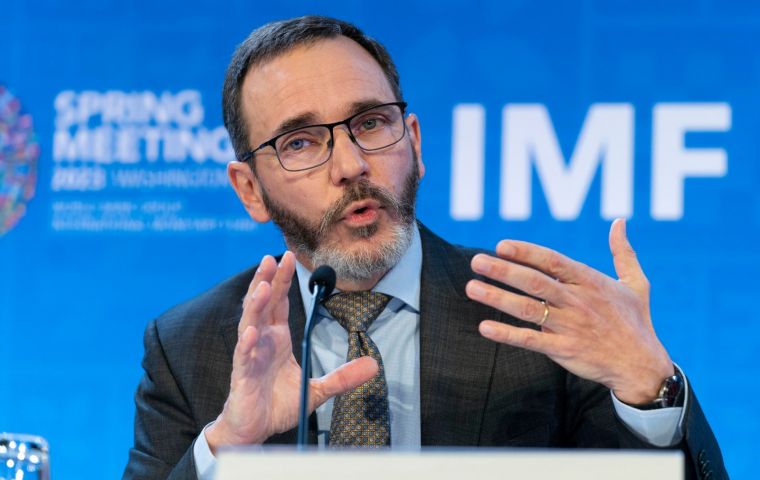MercoPress. South Atlantic News Agency
Latin America to grow this year above IMF's previous projections
 Domestic demand in the region remains “relatively strong,” Gourinchas explained
Domestic demand in the region remains “relatively strong,” Gourinchas explained The International Monetary Fund (IMF) Tuesday admitted that Latin America and the Caribbean will grow 1.9% this year, 0.3 percentage points above April's projections due to the momentum of the economies in Brazil and Mexico.
Brazil will expand by 2.1% (+1.2 percentage points better than the April forecast) and Mexico by 2.6% (+0.8 percentage points).
South America's largest country will grow more than expected three months ago, thanks to “the increase in agricultural production in the first quarter of 2023”, which also has a positive impact on the services sector, while Mexico has been influenced by the consolidation of the recovery in the services sector and “the effects derived from the resilient demand in the United States,” its main trading partner, according to the IMF's outlook.
Expected growth in the region in 2023 is significantly lower than 3.9% in 2022 due to “the recent moderation” of the post-pandemic expansion and “the decline in commodity prices.”
In 2024, the region's economy will grow by 2.2%, unchanged from previous forecasts. At the global level, the IMF insisted that, although better than anticipated, projections remained “weak from a historical perspective” as rising interest rates to combat inflation “continue to weigh on economic activity.”
The IMF expects global inflation to fall from 8.7% in 2022 to 6.8% in 2023 and 5.2% in 2024, but core inflation (which excludes food and energy prices) will decline “more gradually.”
IMF Director of Research Pierre-Olivier Gourinchas said domestic demand in the region remains “relatively strong”, although it is expected to weaken this year compared to 2022. He recalled that this region was the first to implement a restrictive monetary policy to combat inflation, its central banks reacted long before the US Federal Reserve or the European Central Bank did, and that made them feel the effects of rate hikes on their economy earlier. Therefore, although inflation in the region has come down, the slowdown is the result of a year and a half of restrictive monetary policy.
According to Gourinchas, Brazil has achieved a “significant rebound” in its agricultural sector and has infected other sectors such as services. “The country's economy is performing quite well” and that is why they are improving their forecasts for this year, he said.
The expert also recalled that this year's growth forecast for the United States has improved to 1.8% and that Mexico would feel the consequences.




Top Comments
Disclaimer & comment rules-

Read all commentsIMF is like the Casa da Torre that existed in colonial Brazil. From the middle to the end, it was all nonsense.
Jul 26th, 2023 - 02:55 pm -2To be contemporary with these times of change in humanity is a source of pride for me.
Commenting for this story is now closed.
If you have a Facebook account, become a fan and comment on our Facebook Page!